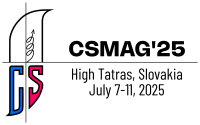Speaker
Description
The effect of uniaxial single-ion anisotropy on quantum entanglement is rigorously quantified using negativity in a mixed spin-($1$,$1/2$,$1$) Heisenberg trimer accounting for different exchange coupling constants between identical and distinct spins. Bipartite negativities between the single spin entity and the remaining spin dimer are analyzed alongside with the global tripartite negativity of the whole trimer under the effect of an external magnetic field and the uniaxial single-ion anisotropy of easy-axis as well as easy-plane type. Interestingly, the uniaxial single-ion anisotropy significantly influences the degree of entanglement by altering the stability regions of energetically preferred ground states and it may also introduce additional phases in the overall ground-state phase diagram. Moreover, it is demonstrated that within specific ground states, the degree of entanglement basically depends on the strength of uniaxial single-ion anisotropy altering the respective probability amplitudes of the corresponding eigenvectors. Finally, the thermal stability of entanglement is discussed in detail including the emergence of a peculiar local minimum at finite temperatures. The obtained theoretical results may bring deeper insights into the bipartite and tripartite entanglement in trimetallic Ni$^{2+}$-Cu$^{2+}$-Ni$^{2+}$ molecular compounds.
Acknowledgements
This work was financially supported by the grant of the Slovak Research and Development Agency provided under the contract No. APVV-20-0150 and by the grant of The Slovak Academy of Science and The Ministry of Education, Science, Research, and Sport of the Slovak Republic provided under the contract No. VEGA 1/0695/23.

